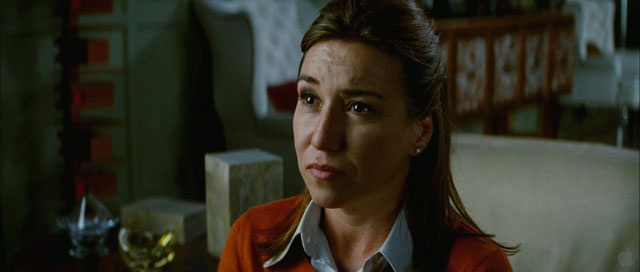Antonio Banderas (first movie of his I’ve watched since Once Upon a Time in Mexico) invents an insect-and-heat-repellent artificial skin, which he’s tested on a beautiful woman who seems to be imprisoned in a room of his house. But the artificial skin is a distraction from the real story – the fact that the girl may be fireproof is sadly not integrated into the plot. Mainly the movie wants to tell us more about Vera, the woman in the room (Elena Anaya of Mesrine), and how she got there, with bonus sub-plots about Dr. Antonio and his family.
Firstly, his housekeeper/chef (Marisa Peredes, star of Flower of My Secret) is secretly his mom, and her misfit son Zeca comes to the house dressed as a tiger, ties up his mom and rapes the girl upstairs before Antonio comes home and shoots him to death, while mom watches on the monitors downstairs. Some of the most intense shots in the movie involve those monitors, Antonio, his mom and Zeca interacting with Vera’s image.

Backstory: Antonio became obsessed with artificial skin after his wife was disfigured in a burning car (crashed by Zeca, with whom she’d been cheating) then threw herself out the window to her death in front of their young daughter, who became a psychological wreck from the experience. Years later Antonio takes his daughter Norma on a rare trip outside her mental hospital to a party, where she’s nearly raped by party-crasher Vicente in the garden. Soon the daughter commits suicide and Antonio kidnaps Vicente, gives him an unwilling sex change and alters his whole body to resemble that of Antonio’s dead wife before her accident.
So, back in the present, it’s no wonder that soon after Antonio starts letting Vera/Vicente leave her room, she starts planning revenge – grabs a gun from his desk and kills Antonio and his mom. Movie ends with a tearful reunion, the beautiful Vera in her family’s shop for the first time in six years telling her mother “I’m Vicente.”
Almodovar will never top the Caetano Veloso interlude in Talk To Her, but he gives us a couple of passionate performances by Concha Buika, just one of the details that lifts this movie above its sordid story.
I meant to rewatch Eyes Without a Face before going to this, but forgot.












